 Go Back
Go BackShare
In Conversation with Rangaiah Kaderla (Head Teacher – Mandal Parishadh Primary School, Telangana)
By CSF Editorial Team and Rangaiah Kaderla
Sep 13, 2024
The diverse experiences of teachers offer valuable insights into education. In Telangana, Rangaiah Kaderla highlights key aspects of foundational learning, such as using teaching-learning materials, teacher training and involving parents and the community. He also highlights how technology plays a crucial role in enhancing student learning, both at school and at home.
Mandal Parishadh Primary School (MPPS), in the Sawarkheda Village of the Kumaram Bheem Asifabad district of Telangana, is situated in a remote forest area near Jodeghat, the birthplace of the legendary Advisai leader Kumaram Bheem. In this article, we hear from Rangaiah Kaderla (Headmaster, MPPS), who shares his journey as an educator in primary grades. Rangiah Kaderla joined the teaching service in 2010 and has nearly 14 years of teaching experience. He has been teaching in MPPS Sawarkheda since November 2010. He currently teaches Mathematics for Grades 1 to 4.
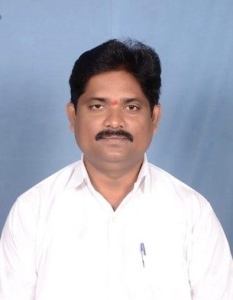
Q1. Reflect on the importance of foundational learning in a child’s educational journey and the role of teaching-learning materials (TLM) in strengthening it.
Foundational literacy and numeracy (FLN) has always been a priority for us, even before the FLN initiative was launched in AY 2022-23 in Telangana. However, the significance of the FLN Mission became more apparent during the prolonged COVID-19 school closures, which caused children to fall behind by two grade levels. FLN initiative has strengthened our teaching methods, aligning us with the textbooks’ philosophy and pedagogy. FLN emphasises on achieving core competencies rather than merely covering the syllabus. The teacher guides provided by the state have significantly improved our lesson planning and execution by helping us understand the design of curricular goals and textbooks.
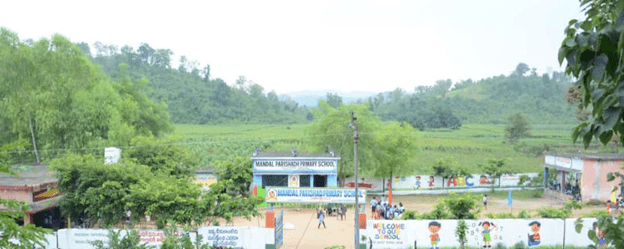
Our school has a sufficient number of teachers, allowing each teacher to focus on one subject for all grades, using state-provided period plans. With the FLN Mission, we have been able to follow and teach effectively by aligning the teacher guides with student workbooks and following the 5+1 teaching approach. In this approach, we teach for five days and assess students on the sixth day using the assessment sheet provided in the student workbook. The 5+1 data has been invaluable in helping us identify student misconceptions, which we promptly address through targeted remediation. The TLMs, particularly the ‘I do, We do, You do‘ strategy in numeracy and the emphasis on oral language development and reading fluency in literacy, introduced in each and every period plan, have been well-received by our teachers.
To cater to students at multiple learning levels in each classroom, we conduct baseline assessments at the start of the academic year to understand each child’s learning level and use a peer learning approach to bridge gaps. We have also implemented extra hours before and after school to support children who are significantly below grade level, helping them catch up. Additionally, we have developed various TLMs across subjects to enhance concept understanding. During peer learning, student leaders use these materials, which motivates us to explore and create even more effective TLMs to strengthen teaching-learning processes in the classroom.
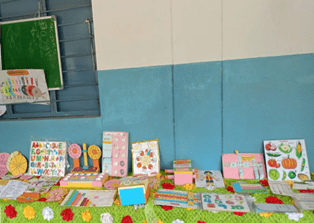

R: TLM being used by students
Q2. How critical do you think teacher training is in improving student learning outcomes?
Training is essential for the continuous growth of teachers. If children are not performing at their grade level, it is not their fault alone. We, as teachers, along with parents and the community members, are responsible for ensuring they do not fall behind. Continuous professional development enables us to reflect on our current teaching practices and learn new strategies that work for children in our context. It also provides a valuable platform for us to interact with our peers from neighboring schools, share our classroom experiences and learn from each other.
In recent years, online platforms have become an integral part of our training programmes; technology has definitely enhanced our training experiences. As we move forward, it would be vital to focus on equipping children with the skills they need to thrive in a constantly evolving world. We see this as a pressing need because with the ever evolving world, learning needs of children also evolve.
Q3. How do you think technology has been integrated into classrooms and at home over the last few years?
The COVID-19 pandemic brought significant changes to our teaching methods. Before the pandemic, the use of digital tools like Zoom, Google Meet and/or other online resources was almost unheard of in our school, largely due to our remote forest location. However, the pandemic made us realise that education could happen anywhere and anytime with the help of technology.
Initially, our teachers were hesitant to adapt to online teaching. But, as more and more teachers around us began sharing their experiences using digital tools, we also made the transition. Unfortunately, due to weak internet connectivity, online classes were not very successful. To overcome this, we created the Super 100 programme, where former students (alumni) teach current students in their village. This ensures that students are not completely separated from learning. Super 100 also ensured that students living in the same locality gathered together to learn amid the pandemic and even conduct a morning prayer each day to retain human touch.
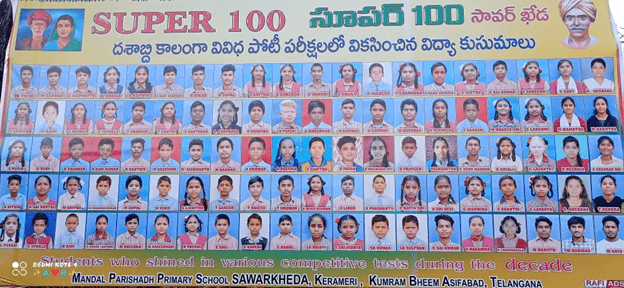
Today, our teachers have come a long way. They have started using technology as an aid in the teaching-learning processes and our children have become adept at using technology as a learning tool at home.
Q4. How have parents and the community been involved in children’s learning journeys in your district? Reflect on whether and how this involvement has evolved over the years.
Involving parents and the community has been a cornerstone of our approach to education at MPPS Sawarkheda. When I joined the school in 2011 as the only teacher with 50 students, my goal was to provide quality education to the children of Sawarkheda and surrounding villages. Over the years, I have built strong relationships with the community and today, the school enrols 250 students annually. I even enroled my own children in the school, with my son currently in Grade 4.
Throughout my journey, I have actively involved the entire village in improving the school. I encouraged parents to see the school as a community resource, leading many to contribute financially and materially to enhance the school’s infrastructure. This collective effort has transformed the school over the past decade, raising donations of nearly 10 lakh, with parents helping to provide everything from furniture, paints to a water purification plant for the school.
Over time, we have seen a significant shift in how parents perceive their role in their children’s education. For example, we hosted the FLN Day in AY 2023-24, with students sharing what they had learnt with the community. Nearby villagers attended the event and stayed for about six to eight hours, leaving all their day routines; this truly signified the connection of the community with the school.
One of our most impactful initiatives has been Ghar Bhangaya Vidyalaya, where each home dedicates a small space as a learning area for their children, inclusive of study materials and a conducive environment for learning.

Alongside this, we introduced the FM Sawarkheda initiative, where students use the loudspeaker to recite poetry, rhymes, share news, ask thought-provoking questions and share health and wellness facts, which made learning a community-driven process, fostering a sense of unity among students and community members.
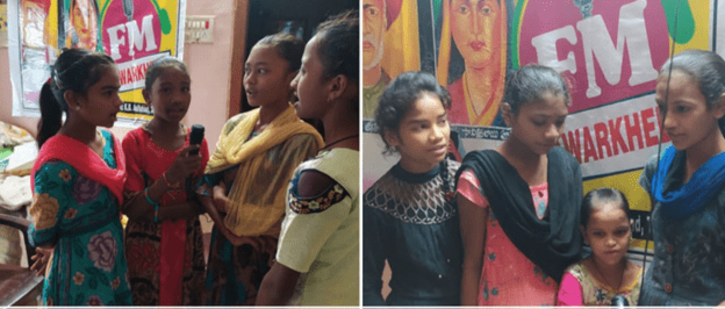
Another achievement that I am particularly proud of is our success in girls’ education. Our efforts in Sawarkheda have not only brought girls back to school but have also significantly reduced the number of child marriages in the area.
We prioritise positive parenting through parent-teacher meetings (PTMs), recognising that children are deeply influenced by their parents’ behavior and actions and that a healthy home environment grooms a well-rounded child with healthy habits and behaviours.
Keywords
Authored by
CSF Editorial Team
Rangaiah Kaderla
Head Teacher, Mandal Parishadh Primary School, Sawarkheda, Telangana
Share this on
